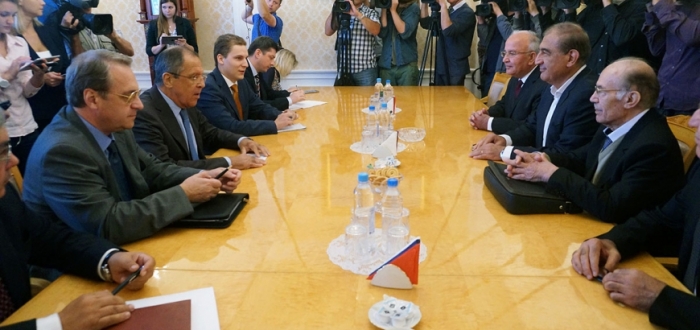The ongoing negotiations currently running in Geneva between the delegations of the Syrian opposition and the Bashar al-Assad regime are on the brink of collapse, at a time when it seems the ceasefire agreement in Syria is breathing its final gasps due to the continuing violations by regime forces, Russia, and foreign militias supporting Assad, thereby pushing the armed opposition to defend the areas where it is present and protecting civilians.
The material point of dispute in Geneva is that the regime delegation, supported by Iran and Russia, still insists on not discussing Assad’s future in power, while the Syrian opposition stresses that its participation in Geneva aims to form a fully-empowered transitional governing authority in which Assad has no role. It seems the United Nations envoy Staffan de Mistura is unable to find a way out of this dilemma, despite his appeal to Moscow and Washington to put pressure on the sides which they support.
It is clear, according to comments by a Russian official, that Moscow stands behind Assad’s insistence on rejecting the formation of a governing authority, and instead simply forming a national government from the opposition and regime, with Assad remaining at the head of power, since the permanent Russian representative at the United Nations in Geneva, Alexey Borodavkin, announced his country’s support for the regime’s proposal to form a national government.
The Russian TASS news agency quoted Borodavkin on Monday as saying that, “The Assad regime presented proposals built around the formation of a national government.” This Russian position is incompatible with what was stipulated by the Geneva declaration of 2012, which called on the Syrian opposition to implement it, while providing for the formation of a transitional governing authority, and not a national government, as Assad wants.
According to its comments, the opposition High Negotiations Committee delegation completely rejects the option of forming a unity government, just as the besieged opposition members in Syrian cities reject Assad remaining in power in any shape or form. This is what suggests that the current round is destined to fail if it continues along the same path, especially given that the voice of military operations has become louder than that of the negotiations.
Opposition Delegation
In a related context, in what appears to be a continuation of the previous Russian efforts to penetrate the High Negotiations Committee delegation, the Russia Today website quoted a source in the negotiations as saying: “There is a plan to form a united delegation for the upcoming round including five representatives from the high negotiations council and three from the Moscow-Cairo-Astana group, one from Hemeimeem, one from civil society, one from among Syrian women, and three national figures including Ahmed Jarba, Maaz al-Khateeb and Burhan Ghalioun.”
The opposition rejects the inclusion of figures from the Moscow-Cairo-Astana groups in the opposition delegation negotiating with the regime, because the groups include figures close to the regime, such as the former deputy prime minister in the Assad regime, and Randa Kassis, who retains close ties to Moscow, along with the previous foreign ministry spokesman for the regime Jihad Makdissi, and Mais Krydee, who was part of the Hemeimeem group, which began its work at the Russian military airbase in the Hemeimeem air base in the Lattakia countryside.
Russian Arabic-speaking media such as the website Russia Today and the Sputnik agency have focused on figures in the noted groups, trying to paint them as “national figures.” In this context, the Russian diplomat Borodavkin said that “Russian diplomacy is always communicating with the government delegation and likewise the opposition circles participating in the Syrian political process,” adding that the talk revolves around the representatives of the Moscow-Cairo-Astana groups and likewise representatives of the High Negotiations Committee adopting moderate and reasonable positions, as he put it.
Moscow has tried through the Hemeimeem group to involve the head of the Kurdish Democratic Union Party (the Syrian wing of the Kurdistan Workers’ Party) Saleh Muslim in the Geneva talks, as the group expressed “its readiness to include Muslim in its ranks, but the group has not received a request from Muslim or a response to its invitation,” according to a source in the negotiations.
Russia backs the Kurdish Democratic Union Party militarily and politically and provides its forces in northern Syria with weaponry, as it supports the Kurds heading toward announcing self-administration, which the opposition considers to be the beginning of partition.
This article was edited by The Syrian Observer. Responsibility for the information and views set out in this article lies entirely with the author.


